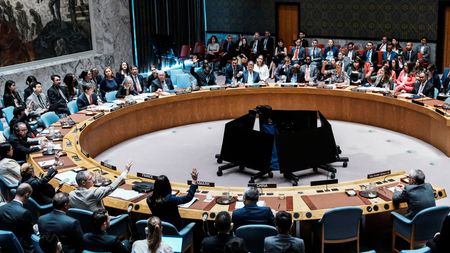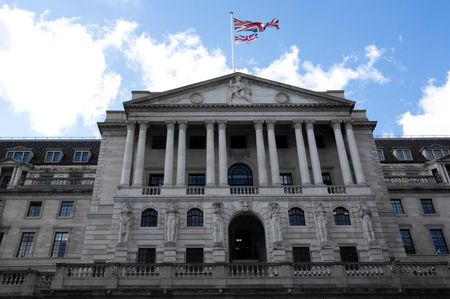By Thomas Escritt and Andreas Rinke
BERLIN (Reuters) – A 30 million euro ($35.24 million) one-time payment to the Palestinian Authority that Germany was hoping to announce next week to coincide with European allies’ formal recognition of a Palestinian state has been held up by sceptical legislators, Bild newspaper reported.
The payment is designed to ensure that salaries of teachers and healthcare workers can be paid at a time when Israel, which collects customs and import taxes on behalf of the Palestinian Authority that exercises limited self-rule in parts of the Israeli-occupied West Bank, is withholding funds. The PA says Israel has withheld around $3 billion.
The German emergency payment was agreed by Development Minister Reem Alabali Radovan during a Middle East trip earlier this month and is supported by both conservative Chancellor Friedrich Merz and his Social Democrat deputy, Lars Klingbeil.
But Alexander Hoffmann, a conservative legislator, told Bild that members of his powerful parliamentary budget committee had concerns about the payment, which they must approve.
“We need more clarity,” he told Bild. “Humanitarian aid is important but it has to be clear what projects are being funded… Projects that endanger Israel’s security have to be clearly excluded.”
Officials said the money was likely still to be paid once legislators’ concerns had been addressed.
The German government says the funds are needed for salaries because of the dire economic situation in the Palestinian Authority area since the start of the Gaza war.
“The Authority is in an acute financial emergency,” a development ministry spokesperson told a regular government news conference on Friday, adding that the start of the school year had already been delayed for this reason.
“We must make sure the money doesn’t end up in the wrong hands,” said Juergen Hardt, a senior conservative and Foreign Affairs Committee Member. “But once that’s done, there are very good reasons for this aid.”
European countries including Britain and France are expected to announce at the United Nations General Assembly that they are recognising a State of Palestine.
Germany is not expected to do so, and is a strong supporter of Israel out of a sense of historic obligation because of its culpability for the Holocaust of Europe’s Jews.
But Israeli Prime Minister Benjamin Netanyahu’s announcement of plans to militarily occupy Gaza, almost two years after the deadly Hamas incursion that sparked the conflict, has brought about a hardening of Berlin’s tone.
Merz said during a visit to Madrid on Thursday that Israel’s actions in Gaza were not proportionate to its stated goals and indicated German openness to backing European Union sanctions against Israel.
($1 = 0.8514 euros)
(Additional reporting by Rachel More and Alexander Ratz; Editing by Peter Graff and Frances Kerry)











